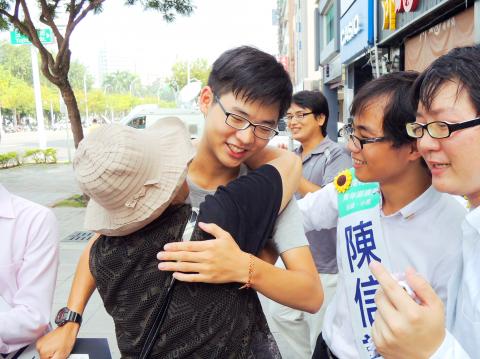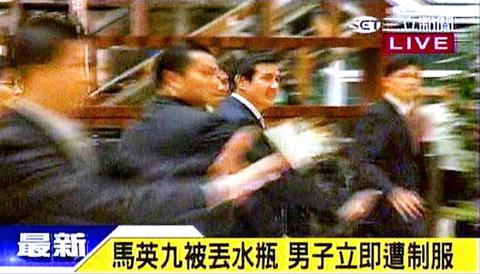The National Security Bureau (NSB) yesterday acknowledged lapses in the handling of security for President Ma Ying-jeou (馬英九) after he was hit by a book thrown by a political activist a day earlier.
The bureau said security lapses have been found among its staff and military police officers, who were responsible for the safety of the president as he attended a reception for international franchise chains in Taipei’s Neihu District (內湖).
The bureau said it would take punitive action against those responsible for the oversights, according to a statement it issued after an internal meeting on the incident.

Photo: Wang Jung-hsiang, Taipei Times
Local media outlets reported that up to 10 people were being disciplined.
Although the bureau had gone over Friday’s security arrangements on site and possessed related intelligence, it still failed to prevent the protester from throwing the book, it said.
A group of NSB personnel who failed to protect the president have been replaced, the bureau said, adding that it would improve measures to ensure the president’s safety.

Photo: CNA
The bureau said that it respects the public’s right to peacefully express their opinions, but people must not break the law and resort to illegal acts.
When Ma arrived at a Denwell banquet venue on Friday for an event hosted by the International Franchise Association, several hundred people were at a fundraiser for the pro-independence Northern Taiwan Society downstairs.
The incident occurred as Ma was preparing to leave the building after the reception.
A group of reporters were waiting to ask him for his response to Chinese President Xi Jinping’s (習近平) advocacy of a “one country, two systems” formula when a man in a black shirt threw a book from the media area.
Shouting: “Taiwan and China, one country on each side,” he hurled the book Formosa Betrayed, hitting Ma in the torso.
Several security agents immediately pinned a man later identified as Yen Ming-wei (顏銘緯) to the ground. Yen was heard continuing to yell: “Taiwan and China, one country on each side,” while being tackled.
Police asked him to leave the venue after identifying him.
Yen is a freshman at National Sun Yat-sen University and director of Greater Kaohsiung-based activist group Flanc Radical’s electoral campaign in Greater Kaohsiung.
“This is my way of responding to what Ma said [in] the Deutsche Welle [report],” Yen said, referring to Ma’s misreported praise of German unification as a possible model for China-Taiwan relations in a recent report by the German radio station.
The station has since corrected its erroneous report and clarified what the president said.
Yen threw Formosa Betrayed, written by former US diplomat George Kerr about Taiwan’s transition from Japanese rule as well as the 228 Incident and the White Terror era during Taiwan’s authoritarian period under the Chinese Nationalist Party (KMT).
Yen first gained attention after he mobilized a large number of students from southern Taiwan to join the Sunflower movement in Taipei earlier this year.
At 18, he is also thought to be the youngest election campaign director in Taiwan.
Yen said he was visiting friends at the Northern Taiwan Society fundraiser when he found out that Ma was in the same building.
“I did not come here with a plan. I just bought the book on the spot from an NTS stand,” he said.
Police later dragged Yen away from Ma and cornered the student near the entrance of a restroom. Seeking help, Yen called his friends at the NTS event downstairs, who sent legal experts to his aid.
Lai Chung-chiang (賴中強), lawyer and member of the Democratic Front Against the Cross-Strait Trade in Services Agreement, and Democratic Progressive Party spokesperson Huang Di-ying (黃帝穎), who is also a lawyer, happened to be at the NTS event and immediately offered legal advice to Yen.
“The police were threatening Yen by saying that he had already been arrested, which simply could not be true,” Lai said.
Regarding the legality of hurling a book at the president, Lai said: “If the book actually hurt someone, it would be an offense of causing injury (傷害罪). However, such a case would require the victim to press charges before police action can be taken.”
Lai said the group was about to leave with Yen, but several police refused to let them go.
Jostling between the two parties ensued.
Lai’s secretary, Chen Guan-yu (陳冠宇), said he was trying to help Lai and Yen leave when he was pinned to the ground by a police officer who accused him of “assaulting police.”
“I really did not hit anybody. I was just trying to stand between the police and lawyer Lai,” Chen said, adding that he received minor injuries on his neck.
Taiwan Association of University Professors president Lu Chung-chin (呂忠津) also joined negotiations at the scene.
“In the end, everybody just realized the need to calm down,” Lu said. “They probably also thought the incident was not worth all the fuss. They just asked Yen to leave some identification information and let him go.”
After the incident, Presidential Office spokeswoman Ma Wei-kuo (馬瑋國) said the president respects the rights of the public to express their views rationally, but any form of violence should be condemned.

CHAOS: Iranians took to the streets playing celebratory music after reports of Khamenei’s death on Saturday, while mourners also gathered in Tehran yesterday Iranian Supreme Leader Ayatollah Ali Khamenei was killed in a major attack on Iran launched by Israel and the US, throwing the future of the Islamic republic into doubt and raising the risk of regional instability. Iranian state television and the state-run IRNA news agency announced the 86-year-old’s death early yesterday. US President Donald Trump said it gave Iranians their “greatest chance” to “take back” their country. The announcements came after a joint US and Israeli aerial bombardment that targeted Iranian military and governmental sites. Trump said the “heavy and pinpoint bombing” would continue through the week or as long

TRUST: The KMT said it respected the US’ timing and considerations, and hoped it would continue to honor its commitments to helping Taiwan bolster its defenses and deterrence US President Donald Trump is delaying a multibillion-dollar arms sale to Taiwan to ensure his visit to Beijing is successful, a New York Times report said. The weapons sales package has stalled in the US Department of State, the report said, citing US officials it did not identify. The White House has told agencies not to push forward ahead of Trump’s meeting with Chinese President Xi Jinping (習近平), it said. The two last month held a phone call to discuss trade and geopolitical flashpoints ahead of the summit. Xi raised the Taiwan issue and urged the US to handle arms sales to

BIG SPENDERS: Foreign investors bought the most Taiwan equities since 2005, signaling confidence that an AI boom would continue to benefit chipmakers Taiwan Semiconductor Manufacturing Co’s (TSMC, 台積電) market capitalization swelled to US$2 trillion for the first time following a 4.25 percent rally in its American depositary receipts (ADR) overnight, putting the world’s biggest contract chipmaker sixth on the list of the world’s biggest companies by market capitalization, just behind Amazon.com Inc. The site CompaniesMarketcap.com ranked TSMC ahead of Saudi Aramco and Meta Platforms Inc. The Taiwanese company’s ADRs on Tuesday surged to US$385.75 on the New York Stock Exchange, as strong demand for artificial intelligence (AI) applications led to chip supply constraints and boost revenue growth to record-breaking levels. Each TSMC ADR represents

State-run CPC Corp, Taiwan (CPC, 台灣中油) yesterday said that it had confirmed on Saturday night with its liquefied natural gas (LNG) and crude oil suppliers that shipments are proceeding as scheduled and that domestic supplies remain unaffected. The CPC yesterday announced the gasoline and diesel prices will rise by NT$0.2 and NT$0.4 per liter, respectively, starting Monday, citing Middle East tensions and blizzards in the eastern United States. CPC also iterated it has been reducing the proportion of crude oil imports from the Middle East and diversifying its supply sources in the past few years in response to geopolitical risks, expanding